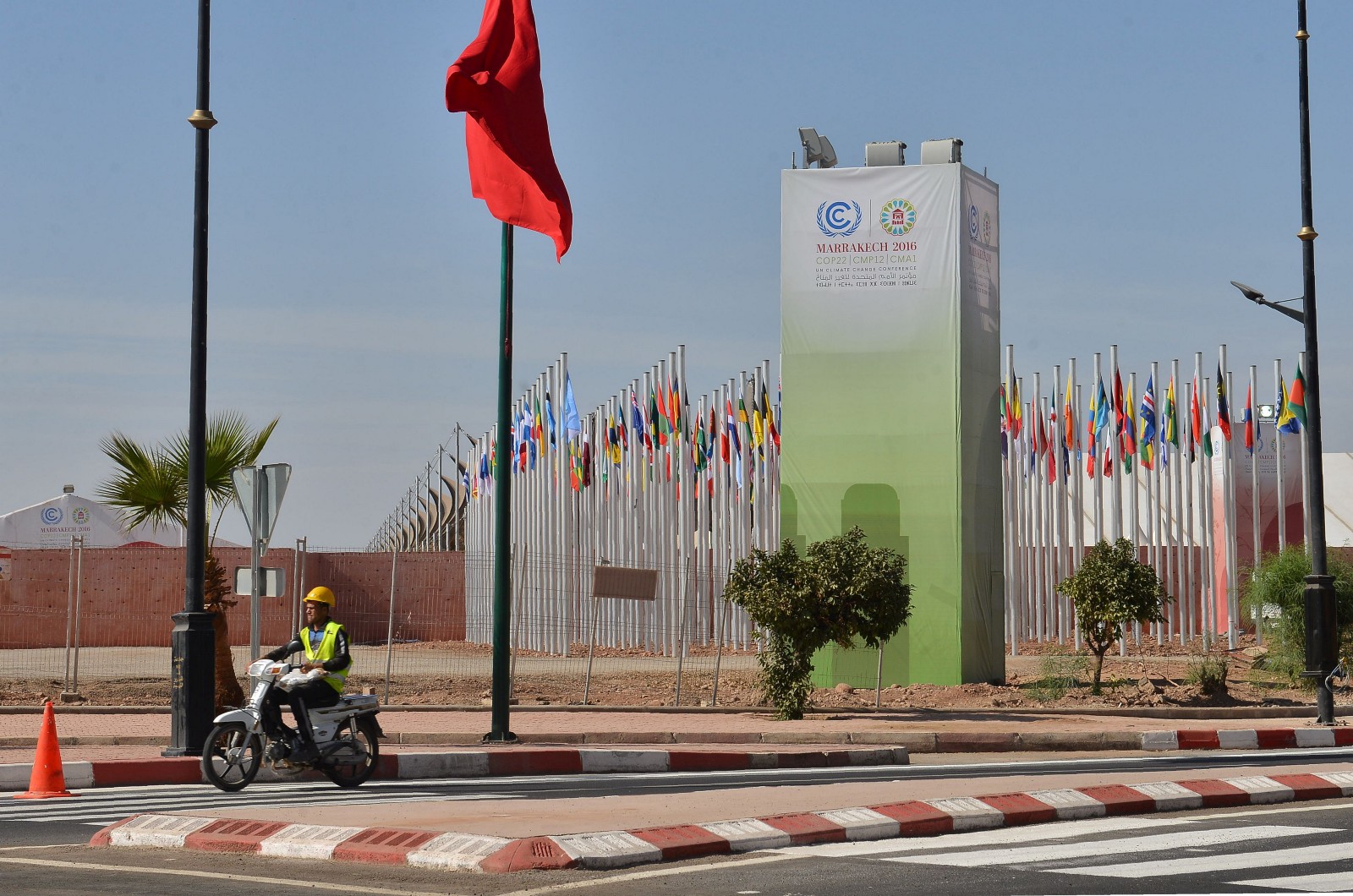
A worker on a scooter outside COP22 Village in Marrakesh, Morocco, on October 31st, 2016. (Photo: Stringer/AFP/Getty Images)
Right next to the Marrakech Royal Palace sits the COP22 Village, a flat expanse of hangar tents organized around a broad avenue lined with palm trees and vaguely Dada sculptures. It’s pretty peaceful — most of the people aren’t here yet — but organizers expect more than 30,000 attendees over the two weeks of the conference.
The setting could hardly feel more different from COP21 (Paris in December had its gray and bitter moments), and the organizers of this year’s COP seem eager to emphasize that Marrakech will not be Paris. Patricia Espinosa, executive secretary of the United Nations Framework Convention on Climate Change, appeared with Salaheddine Mezouar, Morocco’s minister of foreign affairs and president of this year’s COP, to welcome reporters to the talks, and to establish some rhetorical motifs for the conference.
Marrakech Will Be the “COP of Action”
UNFCCC Executive Secretary Espinosa has long been advertising COP22 as “the COP of Action.” It’s a phrase we should get used to, as we’ll be hearing it every eight seconds between now and the close of the talks. (The ministers appear to have a similar contest over the phrase “public-private partnership.”)
Mezouar took up this theme in the Green Zone this afternoon:
It’s really a historical moment. Marrakech will be a moment of inflection in the dynamics of climate, and it is important for Marrakech to be a COP of action — a concrete COP…. My thoughts go to all those who suffer today, the sub-Saharan countries, and also other countries who are experiencing climate changes. They are expecting drastic decisions, and action.
Civil Society & “Inclusion”
COP21 in Paris was historic, and not only for the document that emerged from it; 2015 was also one of the least transparent COPs in history, at least according to many members of civil society. As Lidy Nacpil, a veteran advocate for countries in Asia and the Pacific, told me last year: “This has been one of the most un-transparent COPs that I’ve ever seen.” The Moroccan presidency says it wants COP22 to be different, and Mezouar has announced that, this year, civil society will have greater access and influence during negotiations.
That same spirit of inclusivity extends, crucially, to countries and blocs that have been left behind in the rest of the world’s rush to ratify the Paris Agreement, and who therefore find themselves at a disadvantage during this year’s COP. As my colleague Kate Wheeling has reported, “Everyone is invited to the [COP22] party, but only those countries that have ratified the agreement will have decision-making authority.”
At a pre-COP meeting of ministers last month, Mezouar sought to reassure these straggler countries that there would be a place for them at the table, and he reiterated this message of inclusion today:
I will also add that the Moroccan presidency will be a presidency of inclusion. Nobody will be rejected. We will consider everybody because we have this spirit to share everything and support everybody — to change the mentality.
Donald Trump
Alister Doyle of Reuters snagged the first question at the press conference, and it was the obvious one: What will happen at COP22 if Trump is elected president of the United States — given that Trump has vowed to “cancel” the Paris Agreement if he wins on Tuesday? Espinosa responded by noting that it’s a good thing the Agreement entered into force so quickly:
As you know, any setback on a formal treaty that has been ratified and that has entered into force requires a certain procedure. I would, however, stress in this regard the enormous credibility that the Paris Agreement has, in terms not only of the governments that have engaged through their ratification or accession, but also because of the really great movement that made the agreement possible, and that later on made also the entry into force in such a record time. So of course we will be ready and willing to work with the president that is elected in the U.S. — we would hope that we could engage in a very constructive and positive relationship, it is one of our most important partners, and its participation in this agreement is crucial. But right now what I can say is the agreement has entered into force, and we are all obliged to meet those commitments.
Mezouar smiled, and declined to comment about Trump.





